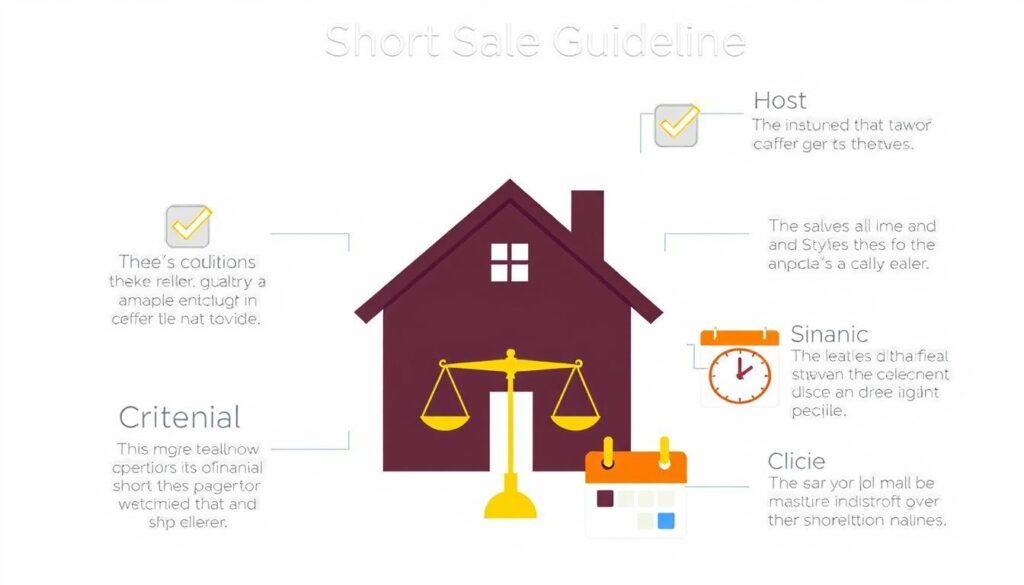Ever thought about buying a short sale home? It could be a great deal or a big risk. Short sales happen when homeowners sell for less than their mortgage, with the lender’s okay. This is still common today, a leftover from the 2008 housing crisis.
Unlike foreclosures, where lenders take back the property, short sales offer a way out. They help avoid the harshness of foreclosure.
Buying a short sale comes with its own set of challenges and benefits. You’ll need to understand the process, including lender approvals and possible repairs. This article aims to give you the info you need to make smart choices in real estate.
For more on short sales and finding good deals, check out this resource on buying a short sale.
Key Takeaways
- Short sales involve selling a home for less than the mortgage owed, often preventing foreclosure.
- The process is lengthier and more complicated than traditional home sales, filled with paperwork and negotiations.
- While buyers can find lower prices, potential property issues and complexity exist.
- Both short sales and foreclosures negatively affect credit scores, but short sales tend to be less damaging.
- Understanding lender requirements and documenting hardship is essential for a successful transaction.
Understanding Short Sales
A short sale is when a homeowner sells their property for less than the mortgage debt, with the lender’s okay. This helps avoid foreclosure and lets the homeowner control the sale. It’s key for buyers to know the difference between a short sale and foreclosure.
Definition of a Short Sale
A short sale means the lender agrees to accept a lower sale price than the mortgage debt. It helps homeowners in tough financial spots by selling their property and reducing losses. It takes teamwork between the seller, buyer, and lender to agree on a price.
How a Short Sale Differs from Foreclosure
Understanding the short sale vs foreclosure shows why short sales are better. Foreclosure means the lender takes the property, kicking out the homeowner. Short sales, however, let homeowners sell their property and help their financial situation. They can work out deals with buyers that help them without the bad effects of foreclosure.
The Short Sale Process
Understanding the short-sale process is key for those looking to buy a short-sale property. It’s similar to traditional home buying but has unique steps. With the right preparation and knowledge, buyers can successfully navigate this process.
Steps Involved in Buying a Short Sale
The first step is finding the right property. This can take longer than usual due to the process’s complexity. Working with a skilled real estate agent can make this easier.
After finding a property, getting pre-approved for financing is crucial. Lenders prefer buyers with solid financial backing. This step is vital for a strong offer.
Negotiation is a big part of the short sale process. Buyers need to be patient, as negotiations can take a while. They must work with the homeowner and the lender to agree on a price. Be ready for delays, as lender approvals can be slow.
Getting Pre-Approved for Financing
Getting pre-approved for financing is a key step in buying a short sale. It involves checking your financial situation and how much you can borrow. Pre-approval shows you’re serious and can make the process smoother.
To get pre-approved, you’ll need to provide financial documents. These include your financial statements, proof of income, and credit history. A strong financial profile can improve your chances in the competitive short sale market. It shows lenders you’re a responsible buyer.
Finding Short Sale Properties
Looking for short sale properties? Consider working with a short sale agent. They know the short sale market well. This helps buyers find accurate short sale listings and steer clear of common issues.
Utilizing Real Estate Agents Specialized in Short Sales
A seasoned short sale agent offers great market insights. They list short sales on local websites and MLS feeds. Look for terms like “subject to bank approval” in MLS listings to spot potential short sales.
Working with an experienced agent boosts your chances of a good deal. They also help understand lender needs.
Searching Online for Short Sale Listings
Buyers can also search for short sale properties online. Using MLS services helps narrow down options in specific areas. Look for properties with big gaps between market value and mortgage balances.
Offers should match the market value to increase lender approval chances. For more help, check out this link on finding short sales.
Short Sale Guidelines and Requirements
Knowing the short sale guidelines and short sale requirements is key for buyers. They need specific documents for a smooth sale. These include:
Key Documentation Needed
- Purchase contract that outlines the terms of the sale.
- Pre-approval letter showing you can finance the purchase.
- Evidence of funds, like bank statements or cash proof.
- Letter of hardship explaining your financial situation.
- Comparative market analysis showing the property’s value.
Having these documents ready can speed up the short sale process.
Understanding Lender Approval Criteria
The lender approval criteria differ by lender. They have specific rules for approval. Approval depends on:
- Proof the home is sold for less than the mortgage.
- Hardship documentation showing financial struggles.
- An assessment of your current financial situation.
Working with a good real estate agent or lawyer helps. They ensure you meet lender needs. This preparation boosts your chances of a successful short sale.

| Document Type | Description |
|---|---|
| Purchase Contract | Legal agreement outlining sale details. |
| Pre-Approval Letter | Letter from lender indicating loan eligibility. |
| Evidence of Funds | Bank statements showing available money. |
| Letter of Hardship | Explanation of financial struggles faced. |
| Comparative Market Analysis | Document showcasing property value in current market. |
Benefits of Buying Short Sale Properties
Buying short sale properties has many advantages for homebuyers. These homes often sell for lower prices than traditional sales. Knowing the benefits can help buyers make smart choices and find great deals.
Potential for Lower Purchase Prices
One big reason to look at short sales is the chance to buy a home for less. These homes are priced lower because the seller is in financial trouble. This means buyers can get a good deal compared to other sales.
Also, short sales usually have less competition. This makes it easier for buyers to find a home without feeling rushed.
Comparison with Traditional Home Sales
Short sales and traditional sales have different benefits. For example, short sales can hurt your credit score less than foreclosures. This means buyers can buy another home sooner.
Short sales also involve negotiations that might be less competitive. This is because the approval process can take months. During this time, there are fewer bidding wars, which can drive up prices in traditional sales.
| Aspect | Short Sale Properties | Traditional Sales |
|---|---|---|
| Average Purchase Price | Lower | Higher |
| Impact on Credit | Less | More |
| Time to Regain Homeownership Eligibility | 2 years | 7 years |
| Competition Level | Lower | Higher |
| Property Condition | Usually better maintained | Varies |
Challenges and Risks in the Short Sale Process
Buying a short sale property might seem appealing because of lower prices. But, it’s important to know the challenges and risks involved. This part will look at the potential problems that can happen during a short sale.
Potential Delays and Complications
Short sales can be complex and often cause long delays. They can take months to close, sometimes up to six months. This is because lenders need to approve the sale, which takes time.
Buyers might face unexpected issues that can stop their plans. These complications can be frustrating and affect their timelines.

Common Reasons Short Sale Transactions Fail
There are many reasons why short sales might not work out. Problems with financing or value discrepancies are common. Also, not talking enough with lenders can cause delays or lost offers.
Short sales need approval from several people, making things more complicated. This can lead to missed opportunities for buyers. It’s wise to get legal advice to protect yourself during this process.
For more information on the risks of short sale properties, check out this guide on risks of buying a short sale.
Who Should Consider Buying a Short Sale?
Short sales offer special chances for some buyers. They attract those ready to handle the deal’s complexities. Knowing who might benefit from a short sale can help make the purchase smoother.
Ideal Buyers for Short Sale Homes
There are a few types of buyers interested in short sales. Seasoned investors see them as a way to buy properties cheaply. They plan to rent them out or sell them quickly for profit. First-time homebuyers looking for a good deal might also be interested.
For these ideal buyers for short sales, being patient is key. Short sales can take longer than usual because of the extra steps involved.
Financial Considerations Prior to Purchase
Before buying a short sale, buyers need to check their finances. Getting pre-approved for a loan is important. It makes offers stronger and speeds up the buying process.
Buyers should also be ready for repair costs. Since properties are sold as-is, there’s little room for negotiation. Knowing the risks, like long waits for lender approval, is crucial for making smart choices.
| Buyer Type | Motivation | Considerations |
|---|---|---|
| Investors | Seeking discounted properties for rental or resale | Need for patience due to lengthy approval processes |
| First-time Homebuyers | Looking for affordable homes | Financial readiness for repairs and contingencies |
| Cash Buyers | Finding opportunities without financing delays | Ability to act quickly during the purchasing process |
Conclusion
The short sale process offers a unique chance for homebuyers, especially in a market with rising foreclosures. Foreclosures have seen a big jump, with 35,196 filings in May. This makes understanding short sales crucial.
Buyers who are ready to tackle the challenges can find great deals. Short sales happen when homes are sold for much less than the mortgage debt. This helps both the seller and the lender, as it’s better than a foreclosure.
Buyers should know the perks of short sales. Unlike foreclosures, which can hurt your credit, short sales are voluntary. They help keep the property’s value and are often quicker, saving on legal costs.
To succeed in a short sale, buyers need the right tools and knowledge. Working with real estate experts in short sales is key. This way, they can make the most of the benefits in today’s market.






